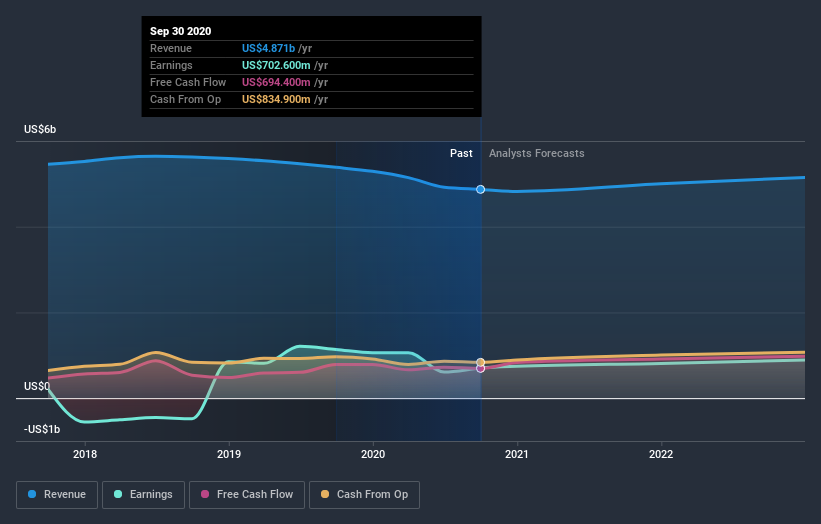The Western Union Company Just Beat Earnings Expectations: Here's What Analysts Think Will Happen Next

Shareholders might have noticed that The Western Union Company (NYSE:WU) filed its quarterly result this time last week. The early response was not positive, with shares down 9.1% to US$19.44 in the past week. It looks like a credible result overall - although revenues of US$1.3b were what the analysts expected, Western Union surprised by delivering a (statutory) profit of US$0.55 per share, an impressive 22% above what was forecast. This is an important time for investors, as they can track a company's performance in its report, look at what experts are forecasting for next year, and see if there has been any change to expectations for the business. We thought readers would find it interesting to see the analysts latest (statutory) post-earnings forecasts for next year.
View our latest analysis for Western Union
Taking into account the latest results, the consensus forecast from Western Union's 18 analysts is for revenues of US$5.00b in 2021, which would reflect a modest 2.7% improvement in sales compared to the last 12 months. Statutory earnings per share are predicted to ascend 18% to US$2.00. In the lead-up to this report, the analysts had been modelling revenues of US$5.02b and earnings per share (EPS) of US$1.98 in 2021. The consensus analysts don't seem to have seen anything in these results that would have changed their view on the business, given there's been no major change to their estimates.
There were no changes to revenue or earnings estimates or the price target of US$23.44, suggesting that the company has met expectations in its recent result. That's not the only conclusion we can draw from this data however, as some investors also like to consider the spread in estimates when evaluating analyst price targets. The most optimistic Western Union analyst has a price target of US$28.00 per share, while the most pessimistic values it at US$18.00. Analysts definitely have varying views on the business, but the spread of estimates is not wide enough in our view to suggest that extreme outcomes could await Western Union shareholders.
Looking at the bigger picture now, one of the ways we can make sense of these forecasts is to see how they measure up against both past performance and industry growth estimates. For example, we noticed that Western Union's rate of growth is expected to accelerate meaningfully, with revenues forecast to grow 2.7%, well above its historical decline of 1.3% a year over the past five years. Compare this against analyst estimates for the wider industry, which suggest that (in aggregate) industry revenues are expected to grow 13% next year. So although Western Union's revenue growth is expected to improve, it is still expected to grow slower than the industry.
The Bottom Line
The most important thing to take away is that there's been no major change in sentiment, with the analysts reconfirming that the business is performing in line with their previous earnings per share estimates. Fortunately, the analysts also reconfirmed their revenue estimates, suggesting sales are tracking in line with expectations - although our data does suggest that Western Union's revenues are expected to perform worse than the wider industry. There was no real change to the consensus price target, suggesting that the intrinsic value of the business has not undergone any major changes with the latest estimates.
Keeping that in mind, we still think that the longer term trajectory of the business is much more important for investors to consider. We have estimates - from multiple Western Union analysts - going out to 2022, and you can see them free on our platform here.
Before you take the next step you should know about the 2 warning signs for Western Union that we have uncovered.
This article by Simply Wall St is general in nature. It does not constitute a recommendation to buy or sell any stock, and does not take account of your objectives, or your financial situation. We aim to bring you long-term focused analysis driven by fundamental data. Note that our analysis may not factor in the latest price-sensitive company announcements or qualitative material. Simply Wall St has no position in any stocks mentioned.
Have feedback on this article? Concerned about the content? Get in touch with us directly. Alternatively, email editorial-team@simplywallst.com.

 Yahoo Movies
Yahoo Movies 

